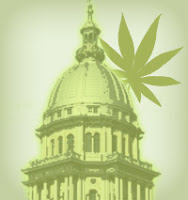 |
| NORML image |
The theme of the November issue of the academic online journal CATO Unbound is “If Not Now, When? The Slow Rise of Marijuana Reform.”
I have the lead essay in the journal, which also features forthcoming contributions from NORML’s Executive Director Allen St. Pierre and other notable drug law reform advocates.
Below is an excerpt from my commentary, entitled, “Cannabis Impact on Health Justifies Its Legalization, Not Its Criminal Prohibition.”
CANNABIS’ IMPACT ON HEALTH JUSTIFIES ITS LEGALIZATION, NOT ITS CRIMINAL PROHIBITION
via CATO Unbound
In July 2011, the Obama Administration rebuffed an administrative petition filed by a coalition of public interest organizations, including NORML, which sought to reassess cannabis’ Schedule I status under federal law. Yet little if any scientific basis exists to justify the federal government’s present prohibitive stance, and there is ample scientific and empirical evidence to rebut it.
… Ultimately, … none of the potential health risks associated with the adult, responsible use of cannabis in any objective way justify the substance’s present Schedule I prohibitive status or legitimize the use of state and federal force to restrict consumers from engaging in the plant’s production, distribution, or consumption. Nor do they justify the Obama Administration’s present heavy-handed attempts to interfere with the rule of law in states that have enacted policies that diverge from that of the federal government’s.
The concerns raised by federal lawmakers and the present administration regarding the potential health implications of cannabis do not validate the drug’s continued criminalization. Just the opposite is true.
There are numerous adverse health consequences associated with alcohol, tobacco, and prescription pharmaceuticals – all of which modern scientific inquiry has determined to be far more dangerous and costlier to society than cannabis – and it’s precisely because of these consequences that these products are legally regulated and their use is restricted to particular consumers and specific settings. Similarly, a pragmatic regulatory framework allowing for the limited legal use cannabis by adults would best mitigate the health risks associated with the drug’s use and abuse. At a minimum, this framework would require federal lawmakers to reschedule cannabis from its archaic and unscientific Schedule I prohibitive status. At best, such a scheme would demand that cannabis be ‘descheduled’ and removed the from the federal Controlled Substances Act altogether.
You can read my entire essay here.
Continue to check back often to the CATO Unbound website as several other essays on the topic, including a commentary by LEAP’s Norm Stamper, will be added to the site and discussed in the coming days.
linkwithin_text=’Related Articles:’


Be the first to comment on "Cannabis’ Impact on Health Justifies Its Legalization, Not Its Criminal Prohibition"